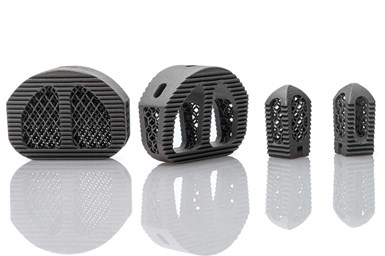Amnovis Simplifies Regulatory Submission for 3D Printed Titanium Implants
Amnovis has incorporated its additive manufacturing process expertise and experience with titanium 3D printing into an FDA Master File to help facilitate customers’ regulatory submissions for 3D printed titanium implants.
Amnovis has created an FDA Master File that simplifies regulatory submission for 3D printed titanium implants. The Master File will benefit medical device OEMs worldwide, giving them faster time-to-market in the U.S., the company says.
In its FDA Master File, Amnovis elaborates on all critical aspects of its qualified titanium 3D printing processes for Ti grade 1 and Ti-6Al-4V grade 23. This enables Amnovis to proactively address typical FDA concerns about these processes, thereby simplifying the regulatory submissions of 3D printed titanium implants in the U.S. for medical device OEMs worldwide. The information contained in the FDA Master File includes the knowledge of Amnovis’ founders in titanium 3D printing and the operational expertise of the Amnovis team.
Amnovis is an Additive Manufacturing (AM) contract manufacturer with founders who have backgrounds in manufacturing high-end AM products since 2008. The company says it was among the first to employ laser powder bed fusion (LPBF) for printing titanium medical devices. It aims to use its AM expertise and experience to remove hurdles in medical device development, validation and manufacturing.
A frequent hurdle for medical device OEMs is addressing FDA concerns about the 3D printing process as part of the regulatory submission of medical devices. To avoid potential delays and issues with approvals for the U.S. market, Amnovis has incorporated its AM process expertise and experience with titanium 3D printing into an FDA Master File. This greatly facilitates the regulatory submission for 3D printed titanium implants for Amnovis customers. The Master File covers critical innovation aspects of Amnovis’ qualified 3D printing processes for standard and patient-specific devices using validated Ti grade 1 and Ti-6Al-4V grade 23 materials.
“Having an FDA Master File is a new milestone for our company and perfectly fits with our strategy of manufacturing high-end products for quality-critical and high-tech applications,” says Ruben Wauthle, Amnovis CEO and co-founder. “Guided by our commitment to quality, we are ISO 13485 certified and combine our thorough understanding of product specifications and process capabilities with state-of-the-art metrology and material testing methods. As a result, we enable our customers to shorten their time-to-market and to eliminate costs related to nonconforming parts.”
As a company, it is making its process knowhow and expertise more readily available to customers worldwide through the FDA Master File. “In the end, this helps the adoption of 3D printed medical devices, which offer more added value for patients and provide them higher degrees of comfort and mobility,” Wauthle says.
- Learn about Amnovis’ collaboration with BAAT Medical on 3D printed medical devices. The companies are focused on pushing the innovative edge of medical device OEMs to move faster through the development, validation and manufacturing stages.
Related Content
-
AM 101: What Is Binder Jetting? (Includes Video)
Binder jetting requires no support structures, is accurate and repeatable, and is said to eliminate dimensional distortion problems common in some high-heat 3D technologies. Here is a look at how binder jetting works and its benefits for additive manufacturing.
-
Video: 5" Diameter Navy Artillery Rounds Made Through Robot Directed Energy Deposition (DED) Instead of Forging
Big Metal Additive conceives additive manufacturing production factory making hundreds of Navy projectile housings per day.
-
Beehive Industries Is Going Big on Small-Scale Engines Made Through Additive Manufacturing
Backed by decades of experience in both aviation and additive, the company is now laser-focused on a single goal: developing, proving and scaling production of engines providing 5,000 lbs of thrust or less.















